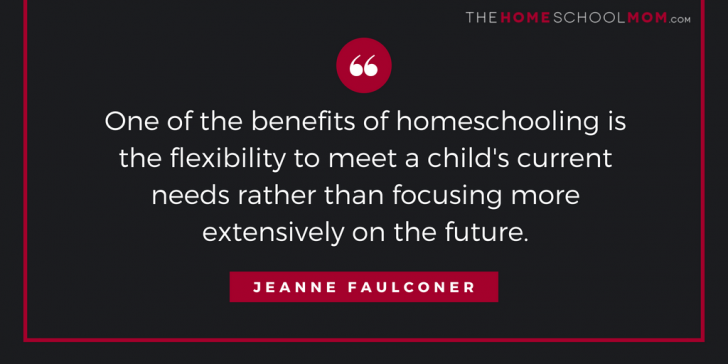What if you asked, "What does my child need right now?" and immediately began working on it, with little to no red tape?
Welcome to Homeschooling's Power of Now. Homeschooling allows the choice to prioritize what your child needs today, whether that's refuge from bullies, time to make art, help for a learning difference, treatment for mental or physical illness, advanced learning opportunities, or more time to play outside.
(Homeschool laws vary by state in the U.S.)
While it sounds like a good thing, one of the problems of public education is that it can be too much about preparing kids for "the future."
In some schools, concentrating on the distant future at the expense of the present can lead to problems like:
- Grade-based minimum standards, focused on curriculum and testing rather than children and their development, individual readiness, or potential
- Lessons that are not relevant to children's lives or interests
- Checking boxes to "indicate" learning rather than facilitating authentic intellectual development
- Eliminating recess and outdoor play in favor of more academic "seat time"
- High stress for kids as children are moved through grade-sequenced curriculum to meet graduation or college entrance standards - again, sometimes ignoring children's preparedness or needs
- Ignoring health problems (mental, emotional, and physical) because the pace and sequence of earning credits is inflexible
- Lack of attention to children's social issues in an atmosphere that prioritizes a specific pace and emphasis on academics
- Prioritizing "head work" (academics) over "heart work" (service) and "hand work" (physical and vocational work), when maturing kids benefit from developing their head, heart, and hands
- Unreasonable and stressful amounts of homework, sometimes of questionable value or relevance
- Cutting out art, music, and enrichment classes in favor of core academics, further reducing relevancy for some kids
One of the benefits of homeschooling is the flexibility to meet a child's current needs rather than focusing more extensively on the future. And a funny thing happens along the way: children whose current needs are met can turn out to be well-prepared for the future.
That said, even homeschoolers are sometimes caught up in the school model, and they don't see--or are reluctant to use--the flexibility of homeschooling to meet their children's current needs.
Homeschooling parents, too, get focused on "college and career prep" too early or too adamantly, sometimes even when a child is clearly exhibiting a current need that should be prioritized.
I'd like to see homeschooling parents use the Power of Now. Don't just ask what does my child need for her future, but what does she need now?
Homeschooling's Power of Now means
- Helping your child learn the next thing he's ready for, regardless of the grade level printed on the book
- Giving your child time and tools to cope with mental health or physical health problems, knowing that learning has to occur as part of a child's whole life situation
- Providing your child with opportunities to learn things that are relevant to the life he's currently living
- Letting your child learn through the lens of her interests today
- Providing a good setting for kids to homeschool with ADD/ADHD
- Giving your child opportunities to serve others and do meaningful work right now
- Taking a child out of a nonproductive or negative school situation
- Really listening to your child, building your relationship by taking her seriously and acting on what she says
Using the Power of Now helps kids develop, make connections, and learn authentically. And sometimes it's a rescue.
Memorizing just enough to pass a test for graduation credits in most cases does not lead to the same intellectual development as problem-solving to solve a mechanical, technical, scientific or artistic challenge that interests a kid. Ignoring health needs in favor of cramming for a high stakes test or meeting attendance requirements does not lead to healthy decision-making about how to manage life - and leads to more health problems.
Insisting a child "must" do this or that because the school requires it, when it's clearly arbitrary, is a set-up for encouraging kids to disrespect "education" and authorities.
Homeschooling parents have a unique opportunity to harness the Power of Now. They can recognize that young people don't come with a Sell By date of 18, with a lockstep march through curriculum and classes at the same institutional pace.
Nope! Homeschooled kids can have the time to graduate earlier or later, or learn about different things, or volunteer more, or start a business, or deal with chronic illness, or work on (or around) learning differences. They and their parents can prioritize mental health, or time with aging grandparents, or learning the family business, or traveling, or math, or athletics, or artistic endeavors.
Does this mean putting your head in the sand about preparing for the future? Of course not. With homeschooling, you can still look at prep for work or college admission--it's possible to keep an eye on the future without sacrificing the present. There's a sweet spot!
That's a balance public school struggles to provide because of its focus on compulsory attendance, required credits, high stakes testing, absentee and truancy policies, and lack of resources for individualized learning. (And by the way, this doesn't mean all homeschoolers hate public schools).
Parents can ask, "How can I help my child thrive right now?" and then do it through homeschooling. It's the Power of Now.





 A popular speaker at homeschooling conferences, business groups, and parents’ groups, Jeanne Potts Faulconer homeschooled her three sons in North Carolina, Mississippi, and Virginia for twenty years. Holding her Master of Arts degree in Communication, Jeanne conducted portfolio evaluations for Virginia homeschoolers for evidence of progress for many years. Jeanne is a former college faculty member, former editor for several publications, news correspondent for WCVE, and former director of Brave Learner Home. She is the contributing editor for TheHomeSchoolMom newsletter and writes the popular Ask Jeanne column addressing homeschool parents' questions here at TheHomeSchoolMom.
A popular speaker at homeschooling conferences, business groups, and parents’ groups, Jeanne Potts Faulconer homeschooled her three sons in North Carolina, Mississippi, and Virginia for twenty years. Holding her Master of Arts degree in Communication, Jeanne conducted portfolio evaluations for Virginia homeschoolers for evidence of progress for many years. Jeanne is a former college faculty member, former editor for several publications, news correspondent for WCVE, and former director of Brave Learner Home. She is the contributing editor for TheHomeSchoolMom newsletter and writes the popular Ask Jeanne column addressing homeschool parents' questions here at TheHomeSchoolMom.
I so loved your article . Thank you so much . I truly enjoyed it. I have a question. I have a 4,5 year old and all she wants to do is play Legos, draw pictures and play with her toys. Occasionally she likes for me to read books to her. I agree that I have to follow her interest if homeschooling is what we as a family want to do. But as a teacher by trade ( I taught in Russia,) and being a daughter of a teacher, I want her to sit down with me at the table and write letters, numbers, etc, prepare her for the future. My curriculum based mind doesn't allow me to just relax and be in the Now. What do I do? When do I start teaching her if it's too early now? Thank you
Hi Lana,
I think playing Legos, drawing pictures, playing with toys, and reading books is a great start for a 4.5 year old. You might be interested in our article, "What Curriculum Should I Use for My Four-Year-Old?"
Many parents who have teacher training and experience are anxious to begin formal lessons, even though there is a lot of evidence that early formal lessons may actually hurt later achievement. A lot of this has to do with the attitude of the parent. Does the parent require a child to sit down and do curriculum when the child resists? Or does the parent invite the child to enjoy sitting at the table while learning a new letter, drawing a picture, and having a snack? Gently introducing short periods at the table that are pleasant and brief can be interesting for a child; lessons that "go on and on" or require more than a child can take in will create pushback. Since we homeschool, we can look at how a child is responding to see if the lessons are welcome or if they are making a child feel "sour" about something a parent intends to be positive.
You might be interested in our Parental Deschooling series of articles. These five articles help us see that not everything that is done at school has to be done during homeschooling.
Curriculum can be a helpful tool. At school, curriculum has to be a driving force since all children are to move through it at the same pace. At home, we can keep the child at the center of the process.
Sometimes it helps to turn things around. Instead of asking yourself, "When do I start teaching her?" ask yourself, "How do I help her learn?"
Jeanne